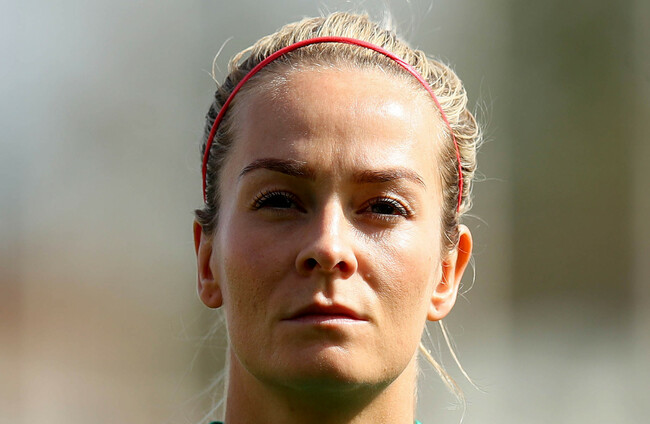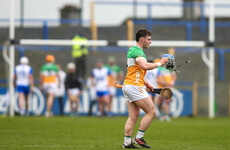AS A child, Ireland international Lily Agg was confronted with two choices.
“Her older sister, Daisy, hated all sport,” her mum, Ruth, tells The 42.
“We would go into shops. Daisy would go to the left and pick up pink sequins and fluffy [stuff] and Lily would go to the right and pick up tracksuits and trainers.
“Everyone used to say: ‘Oh, they’re so different.’ I used to say: ‘They are different actually, which is great.’”
Even at that tender age, Lily was not someone especially eager to conform to what was expected of her.
“Probably from about the age of two, she wouldn’t wear a dress,” says Ruth. “She was always very quick, very bright. She was like a little dolly, she was tiny.
“My mum, when she was about three, bought her a doll and a doll’s pram for Christmas and she said: ‘Oh, I don’t really like dolls and prams.’ And so she was always doing something in the garden, always with a football.”
Lily’s stepfather, Wayne, swiftly noticed the youngster’s footballing talent.
“We lived in a cul de sac,” he says. “So she was out with all the boys, just playing. She used to come in absolutely covered [in mud] and with a big smile on her face. She just loved it from then so as soon as she got to five or six, I took her to [Eastbourne] Borough Boys. I thought: ‘Just get her in a proper side.’”
Ruth adds: “The [coach] was kind of saying: ‘Oh, we don’t really have girls. But you know, she can join in.’ And obviously, by the time she joined in, he came back and said: ‘Well, she outran the boys, got four goals.’”
Wayne was happy to spend the majority of his downtime helping Lily realise her potential as a footballer, while Ruth looked after the other kids.
At 10, the level of commitment became more intense as Lily joined Brighton’s School of Excellence.
“He was a plasterer. And he’d come in from work, covered in plaster, change his clothes, be in at six and have to leave a quarter past six to drive to Brighton.
“And they would be home at nine before he had even had tea. And again, in those days, he would sometimes sit in the car in the winter, because it was too cold to wait outside while they were training.
“He invested years and years into Lily’s football.”
She continues: “He would give other children lifts because they didn’t have transport. And some children’s parents didn’t invest, and sometimes he’d go and get doughnuts for them.
“It was not because the parents didn’t want to go but they couldn’t physically go there if they were single. So I think that’s about being a community as well, isn’t it? I think there’s something about football mums and dads and how they work with each other.”
“I basically spent nearly all my time with Lily because I love football,” says Wayne. “I would just do all the football runs and that. The thing I liked, I think it was U7s or U8s and I went to watch a game with the Borough Boys. The ‘keeper would kick it out, it bounced three times before anyone touched it. So I said to her that Saturday: ‘Do you want to come down to the park?’
“I started throwing the ball at her to head it, I did a few kicks and at the end of the day, I must have put about 200 crosses in and since then, she’s been cracking in the air.
“I mean, she’s only small but the amount of headers she wins [is impressive]. So she just works hard at stuff like that.”
In addition to her parental duties, Ruth also had to balance work as a nurse.
In that sense, she was following in the footsteps of her own mother, Breda Greene, who came over on the boat from Ireland to do nurse training before meeting Lily’s grandfather.
Ruth’s sister is also a nurse and midwife, while her youngest daughter is training for nursing
So given that she comes from a family of nurses, it’s perhaps no surprise that people speak about a natural empathy in Lily that is not necessarily common among footballers.
“I was a ward sister, managed a ward,” explains Ruth. “So I had a senior role quite early on in my career because I trained in London, and I’d done a lot of different courses and qualifications.
“So there were lots of childcare arrangements and after-school clubs and juggling, and again in those days, there was no help with anything as such.”
“She’s quite high up Ruth, she’s had some cracking jobs,” says Wayne.
“[Ruth] used to sort out special days where you would go and watch a football match or take the kids to a play or something like that. She organised the fun for that.
“Of course, everyone you meet you know is not going to be there for too long. It’s quite hard, being in a hospital with young cancer patients.”
***
Lily’s career has not been short of setbacks and frustrating moments.
“She became very disgruntled because I think then it might have been when she was about 13, you weren’t allowed to play with boys after that,” remembers Ruth. “Oh, she was furious. And so she had to leave the boys and they were very successful.”
Football also wasn’t Lily’s sole sporting interest — she similarly spent time playing netball, cricket and basketball, excelling at the latter in particular. Academically, she was also strong, consistently achieving outstanding exam results.
As a teenager though, she began encountering injury problems.
“Obviously, there was no such thing as physio,” says Ruth. “When she was about maybe 14, her leg was hurt. And it was this Osgood Schlatters disease. And there was nothing you could do. But I took her to a private sports specialist in Eastbourne who has written a book, he was part of the Olympic disability squad, a wonderful chap.
“And he was like: ‘No, it isn’t that.’ And he was saying: ‘They don’t do stretching enough and [it's] about growing and her bones.’ In those days, they didn’t do the rehab and physio, there was nothing. If you hurt your leg, you just sat it out for six weeks. And then you went back.
“So those additional things, stresses and little glitches that you had to sort of fund yourself.”
In 2010, Lily received an offer to join Arsenal, however, at one point, it seemed she would be unable to accept it.
Lily had gained four A* and two As in her GCSE exams, and was also working in McDonald’s at the time to help fund her footballing dream.
An article in the Eastbourne Gazette entitled ‘Schoolgirl Lily’s football dream could slip away if funding not found’ quoted Ruth on the struggle to afford the £6,000 a year residential fees that would enable her to join Arsenal.
“I’ve brought Lily up to believe that you have to work hard to get what you want but if I had been on benefits, Lily would have received £4,000 a year residential bursary,” she said.
“I earn good money but I have four children and need to pay child care fees for my two little ones.
“When you take out the mortgage, there’s not much left.
“It’s such a tragedy — it’s her life, it’s her biggest dream.”
Luckily, it worked out in the end and Lily was able to join Arsenal U19s.
“We were very fortunate,” reflects Ruth. “Again, the community came together. And they fundraised for her those fees for the actual period of lodgings and that was all arranged.”
Ultimately, however, Lily declined the offer of a full-time contract after a couple of years with the Gunners and chose to prioritise her university studies. She still also played football during this period, lining out for Brighton and Millwall.
“She went to university, she did her four-year teaching PG cert and everything,” says Ruth. “And then she used to be doing a dissertation while driving to Millwall for football and back.
“I don’t know how she did it and they didn’t get paid then. They just got 50p a mile and it was miles to drive when she used to go to Millwall. So that’s kind of how she’s always been — always been that girl with a ball.
“Her first job was in a beautiful private school, just a wonderful venue to start off with her first role.
“And then she had a job in their grammar school. So she’s done really, really well. And then in between that now, she’s been still been doing lecturing, 16-year-old boys in PE.”
***
Agg had been planning to represent Ireland for quite some time but issues including injuries, the pandemic and passport problems meant it took longer than expected.
Nevertheless, she has made a swift impact since linking up with the squad, scoring on her debut last year in a 1-0 win against the Philippines.
Agg was a crucial part of the qualification run-in, scoring the winner and picking up the player-of-the-match award amid the 1-0 victory over group rivals Finland that secured Ireland’s spot in the play-offs.
Safe to say, it was worth the wait.
“She had an awful fracture of her leg and was out for a year [before then],” says Ruth. “I’ve never known such resilience. I mean, her leg was just awful. And she was just devastated. But she got on with it.
“I’ve still got a little [video] when she went back on the running machine that she sent me saying: ‘Look, I’m running mum.’ Because you cry when your children are injured and you cry when you think: ‘Please don’t let it be the ACL, please don’t let it be this.’
“She could barely walk because she had got this huge, great big brace. And even for me [it's tough], I had many sleepless nights over that injury.”
***
Lily has spent the vast majority of her career combining football with teaching and other work on the side — she recently completed her Uefa B coaching licence.
Nevertheless, in March of this year, she decided to pause everything and focus entirely on World Cup preparations.
“She just said: ‘If I’ve got any chance of going to the World Cup for once in my life, I’m going to focus just on my football,’ recalls Ruth. “They offered her a whole range of solutions with her hours but she just said: ‘I just want to stop for a minute.’
“Obviously, her income will go down quite a bit, but she said it’s not about money for me at the minute now. And probably it’s the first time in her life that she’s just been able to go do football.
“I’ve actually encouraged it. You can manage as long as you’ve got enough to pay for the essentials. Absolutely, just do it.”
There was worry at one point, however, that she might miss out.
An ankle injury meant Agg was unavailable for the double-header of friendlies against the USA back in April.
She consequently faced a race against time to be fit for Australia.
Perhaps no person was more important to her subsequent recovery than Kevin de Keijzer, the strength and conditioning/rehab coach at her club, London City Lionesses.
Over the past couple of years, he has worked in both men’s and women’s football, preferring the latter.
“I’ve always found that when I worked in the men’s game, it was an opportunity, obviously, and you sort of had to be really grateful to be there, and generally people didn’t treat you very well,” he explains.
“But also the engagement that you had with players, the engagement that you had with coaches was, I would say, not very exciting, very much stuck in in the past, very much ‘this is how we’ve always done things’.
“I can’t speak for Ireland, but in England, it is driven into young girls that you can’t be a footballer forever, it’s very realistic. And I think that’s a healthy thing. Because when they get injured, they have a different identity.
“So, Lily’s gone to university, she’s had experiences outside of football. So when you’re sat there and you’re rehabbing Lily, you’re rehabbing a female player, I often find you have much more stimulating conversations because you’re not just talking about bicep curls and what’s happening on Instagram.”
Kevin got to know Lily especially well when he began working closely with her once she suffered the debilitating, World Cup-threatening injury. How would he describe her?
“Driven, stubborn, and dedicated. And very, very thoughtful. She thinks about other people. And she puts other people first, often, which I think is a great quality.
“She never really conformed to what other people wanted, which I think in the right environment can be fantastic because young people need to see that — they need to see a strong role model like her.”
Along with sports therapist Laura Clint, the trio worked together in the hope of maximising Lily’s chances of being as fit as possible ahead of going into camp with Ireland.
“So we had a Google Doc, which was shared with everyone, a calendar going forward and we had dates to look forward to. I think it was minus 50 days to camp [to begin with],” says De Keijzer.
“We basically said: ‘Okay, well, what do we want to do the week before camp? Before camp, we want to have X amount of football sessions. We want to make sure we get X amount of loading in the gym. And we want to expose you to at least this. If we want to do that the week before, what do we need to do the week before to be confident that you’d be ready for that? So almost working backwards from where you’re trying to get back for.”
And what was De Keijzer’s proudest moment watching Lily?
“When she first did the ankle, you could see the worry and the anxiety in her face,” he recalls.
“It’s little things that she ticks off like she’s able to balance on one foot. And then she’s able to balance and drive her knee forward, and then she’s able to throw her leg back and throw her knee forward. And then she’s able to do that with a bit of weight. And then she can do it in different directions. And it’s little wins like that really.
“If I look back now, I can picture them in my head. And we did a good job of really filming all of this. And we made a little video montage where we filmed things day after day, and we showed ourselves how much progress we made.”
***
Barring another injury scare, Lily Agg is likely to be as important a player for Ireland in the pivotal coming weeks as she was during the qualification run-in.
It will be a proud moment, not just for the 29-year-old, but for the many people who have known and helped her along the way.
“Even [in the recent friendly against Zambia], she wasn’t playing but watching them, just the different emotions for all those girls, knowing that they probably all had similar journeys to Lily and knowing how much it means,” says Ruth.
“My dad’s 86, her granddad, he still rides a bike 20 miles on a Saturday. He is the fittest, is not on any medication, the most amazing [person]. And he’s had to live without my mum [Lily's Cobh-born grandmother Breda sadly died approximately 20 years ago] for all this, he is just so delighted and thrilled. And he says all the time: ‘Your mum would just be so proud.’”
Ruth concludes: “She [often] says ‘I’d be so happy if I was 10 years younger, I would just do football [as a career].’ But again, that journey to get there actually makes you relish and appreciate life and the moments in a greater way. Because she had to work so hard, I think Lily doesn’t take anything for granted.
“I think she absolutely gets where everyone else is in it and is, you know, the least selfish person I know and thoughtful and kind. So I think that’s maybe been because of where she’s been. So she understands injury, she understands the challenges for parents and families and siblings.”


















Great read.. It’s hard not to admire a person like this…
“Good luck at the WC because you certainly deserve it”
This site is gone to the dogs can’t read a thing